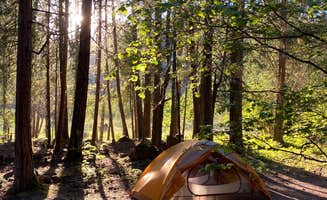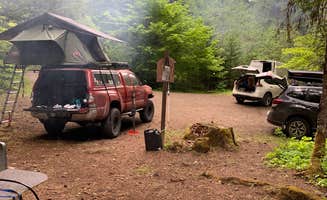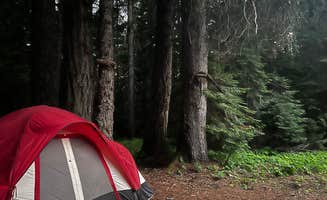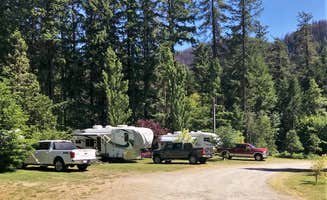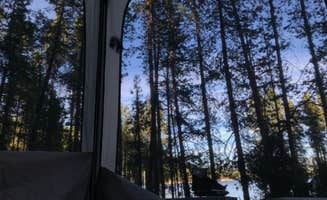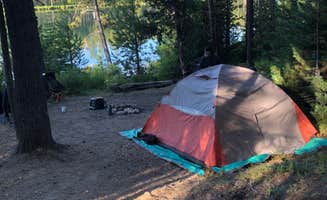Campsites near Clearwater, Oregon extend from 2,700 to 5,200 feet elevation throughout the Umpqua National Forest, creating distinct camping temperatures and seasons. Summer temperatures typically range from 45-85°F depending on elevation, with significant nighttime cooling even in July. Many forest campgrounds stay open from late May through October, with access roads often remaining snowy until late spring.
What to do
Hot springs access: Visit Umpqua Hot Springs Trailhead for natural thermal pools with mountain views. "The hot springs themselves are lovely. Go with a sense of humor and appreciation for the nature and you'll enjoy it," notes one visitor. Best to arrive before sunset when crowds are thinner.
Waterfall hiking: Several short trails lead to cascades within 20 minutes of most campsites. "Toketee Falls and Umpqua Hot Springs are a few miles down the road. Enjoy!" reports one camper. Most waterfall trails are under 1 mile round-trip with minimal elevation gain.
Lake activities: Diamond Lake Campground offers fishing, swimming, and boating just 15 miles from Crater Lake National Park. "What more can you ask for? Clear waters, spectacular Mountain Views. Swimming, hiking, camping, fishing, the possibilities are endless," states one reviewer. The lake maintains consistent fish stocking through summer.
What campers like
Waterfall proximity: Multiple falls within short driving distance create excellent day trip options. "We enjoyed the Toketee camp ground because it was away from everything and the employees and people were very kind. There were plenty of activities around the area to enjoy," shares one visitor.
Natural swimming spots: Cold, clear creek pools provide refreshing summer alternatives to crowded lakes. According to a camper at Umpqua's Last Resort, "A cool creek swimming hole in the forest is very nearby. The whole setting is really well maintained with nice landscaping."
Stargazing opportunities: Minimal light pollution creates exceptional night sky viewing. "The stars looked so nice at night, no light pollution!" reports one visitor at Lemolo Lake. Most campsites have adequate clearing for night sky observation despite forest cover.
What you should know
Mosquito preparation: Bring plenty of repellent, especially for riverside sites and early summer camping. A visitor at Clearwater Falls Campground notes: "Peaceful and relaxing. A great, cheap place to crash the night. Lots of mosquitoes due to proximity to water...but would 1000000% stay again in a heartbeat!!"
Temperature fluctuations: Pack for significant day-to-night temperature drops, even in summer. "We stayed in Broken arrow with our Scouts in July of 2021 and found it surprisingly cool at night for it being July. Temps dropped in the the low 30's both nights," explains one camper.
Limited supplies: Stock up before arriving as nearest stores are limited. "When they say you're 'away from it all', that means stock up on supplies BEFORE you get to your campsite," advises one camper. The closest full grocery stores are 60+ miles from most Clearwater area campgrounds.
Tips for camping with families
Creek exploration: Shallow water areas provide safer play zones for children than the fast-moving river. A camper at Poole Creek Group Campground shares: "Lake is good for swimming, camp site has lots of room, and lots of trees for shade which was nice since it was like 102!"
Wildlife viewing opportunities: Early mornings offer best viewing times for chipmunks, birds, and occasional deer. "The wildlife is so cool. Great spot for birdwatching!" notes one visitor. Morning hikes before 9am typically yield more wildlife sightings.
Evening planning: Prepare activities for cool evenings when temperatures drop rapidly. "It was a long drive for us, but an amazing find. The owners were amazing and very friendly," mentions one family. Board games and warm clothing help with chilly evenings that can drop below 40°F even in summer.
Tips from RVers
Site selection strategy: For larger RVs, arrive early to secure appropriately sized spots. At Thielsen View Campground, one RVer notes: "Five total sites here, smallish, too small for big rigs or anything over 20 ft except one site suitable for up to 30 ft."
Generator regulations: Many forest service campgrounds have specific hours or prohibit generators entirely. "No hookups, so probably generator noise. Probably lots of noise on the weekends!" explains a visitor. Generator hours typically run 8am-8pm where permitted.
Water access planning: Prepare for limited or non-standard water connections. "Water is avail throughout the place but you better have a water bandit as there are no threads on the spigots," advises one RVer at Poole Creek. Many sites require water tanks filled in advance.


